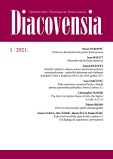Politički subjekti u odnosu prema reformnom pokretu i starokatolicizmu – političko djelovanje radi slabljenja Katoličke Crkve u Kraljevini SHS-u do 1929. godine (II.)
Political Entities in Relation to the Reform Movement and Old Catholicism – Political Efforts to Weaken the Catholic Church in the Kingdom of Serbs, Croats, and Slovenes by the Year 1929 (II.)
Author(s): Daniel PataftaSubject(s): Christian Theology and Religion, History of Church(es), Political history, Politics and religion, Interwar Period (1920 - 1939)
Published by: Katolički bogoslovni fakultet u Đakovu
Keywords: reform movement; Croatian Old Catholic Church; political Catholicism; Pribićević; Stjepan Radić; Serbian Radicals; Freemasons; Catholic Church; political opportunism;
Summary/Abstract: Because of the connections of the reform movement with the land government in Croatia and the central government in Belgrade, where Pribićević’s independent Democrats held the leading positions, as well as the open affection of Pribićević and his party colleagues, the liberal press began to view the reform movement as a kind of exponent of anti-Croatian politics. On Radić’s attitude towards the reform movement and Old Catholicism we can say that it was opportunistically and politically motivated in order to weaken the influence of the Catholic Church on the village and peasantry, especially the Croatian People’s Party, as the core voting base of his party. Even though some members of the Croatian (People’s/Republican) Peasant Party were in favor of promoting Old Catholicism purely out of interest, Radić never publicly endorsed the Croatian Old Catholic Church and its activities, regardless of his anticlerical and anticatholic positions.
Journal: Diacovensia: teološki prilozi
- Issue Year: 29/2021
- Issue No: 1
- Page Range: 27-42
- Page Count: 16
- Language: Croatian

